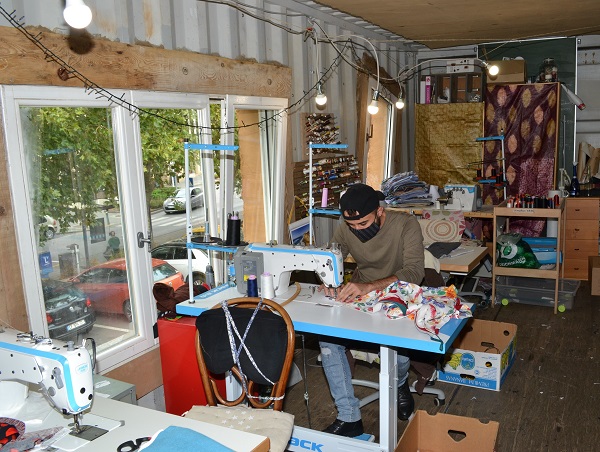 BENU Village Esch;
Credit: MECO
BENU Village Esch;
Credit: MECO
In 2019, BENU Village Esch generated a turnover of €210,000, of which €80,000 came exclusively through the sale of clothing.
On Thursday 3 September 2020, Luxembourg's Minister of the Economy Franz Fayot visited the BENU village in Esch-sur-Alzette. Founded in May 2017 by Georges Kieffer, this ecological village is built and operated according to the principles of the circular economy. Eighteen people currently work for the village, which generated a turnover of over €200,000 in 2019.
The ongoing construction of the BENU village (like “Be New” in English) is being carried out through the use of recycled components and materials. The project itself covers different aspects of the circular economy and includes, in addition to the construction of ecological buildings, the collection of old clothes transformed into new clothes, as well as the organisation of upcycling workshops. By the end of the year, the village will also have a restaurant where local dishes will be served, made with unsold ingredients left over in stores.
Soon, the project will also allow the reuse and redistribution of professional and private equipment such as kitchens, furniture or construction materials. From 2021, the spaces created will be rented to professionals who commit to respecting the BENU charter based on social responsibility, ecological excellence, local production and transparency. Ultimately, the ecovillage will be the largest and most sustainable in the Greater Region.
During his visit, the Economy Minister, accompanied by Mandy Ragni, Alderwoman of Esch-sur-Alzette, visited the various buildings that make up the village, including the clothing store.
Since 2016, the circular economy has been at the heart of the concerns of the Ministry of the Economy, following the publication in 2015 of a first study on its overall impact. Since then, the ministry has taken a number of steps aimed at making Luxembourg a real “laboratory for the circular economy”. The government programme promotes the transition from the current linear economy to a circular, efficient and renewable economy that respects the limits of ecosystems. The ambition is to create an ecosystem that is conducive to the development of circular business models. In this perspective and in order to federate and align public actors and national initiatives, a national interministerial strategy is in preparation and will be presented by the end of the year.
In addition to this strategy, the Ministry of the Economy has been piloting and developing for more than two years, in close collaboration with twelve other countries, a Product Circularity Data Sheet (PCDS). This project aims to define an audited standard to allow efficient reuse of manufactured products at the end of their cycle of use. The Economy Ministry, in close collaboration with the Ministry of Finance, has also launched a call for projects to carry out a study, the objective of which is to establish a roadmap aimed at making Luxembourg a European business hub for the circular economy. The ministry also financially supports investment projects with a circular aspect with an additional 20% bonus.
Economy Minister Franz Fayot stated during his visit: “I am delighted with the success of BENU village which plays an important role in raising citizens' awareness of the circular economy. For a successful implementation, it is essential that all stakeholders are involved and BENU plays a key role in the field. With eighteen jobs created and a significant reduction in waste, it really has the desired impacts in terms of integration and social cohesion".








